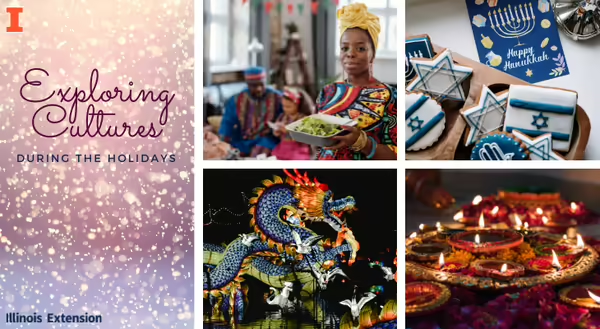
The holiday season is upon us. This season is marked by twinkle lights bedecking all the houses and festive songs playing on all the radios. You can see Santas and stars, reindeer and wreaths everywhere you look. Here in the United States, these things are customary signs of the winter holidays.
But these customs are far from universal. Holiday celebrations differ across cultures, backgrounds, and faith traditions, both here in the U.S. and abroad. And learning about these differences can be a great way for you and your family to build cultural competence. This year, make it a new holiday tradition to explore the holiday traditions of others. Here are just a few to get you started. (The holidays listed below are generally celebrated during November through February)
- DIWALI – (Nov 4, 2021) One of the most important holidays in India, Diwali is a five-day celebration that means different things in different regional or religious cultures. People celebrate by lighting clay lamps and fireworks, cleaning their homes, and sharing sweets.
- HANUKKAH - (Nov 28-Dec 6, 2021) This Jewish “Festival of Lights” commemorates the rededication of the Second Temple in Jerusalem. It’s celebrated with eight nights of games, gifts, traditional foods (like latkes and jelly doughnuts), and lighting the of the menorah.
- ST. LUCIA DAY – (Dec 13, 2021) In this Swedish tradition, St. Lucia is honored with a candlelit procession, special saffron buns, and traditional songs. Traditionally, a young woman is chosen to represent St. Lucia and wears a wreath of candles in her hair.
- LAS POSADAS – (Dec 16-24, 2021) Primarily observed in parts of Latin America, this 9-day celebration honors Mary and Joseph’s trek to Bethlehem and search for an inn before the birth of Jesus. It is commemorated with a procession of children through town, songs, scripture readings, and the breaking of pinatas filled with cany and toys.
- WINTER SOLSITCE – (Dec 21, 2021) This official first day of winter also marks the longest night of the year (in the northern hemisphere, that is). Both historic and modern cultures around the world have celebrated this astronomical event, such as Dong Zhi in China and various traditions of Indigenous tribes.
- KWANZAA – (Dec 26, 2021 – Jan 1, 2022) Created in 1966, this 7-day holiday celebrates African American culture and heritage. Each day focuses on a different principle: unity; self-determination; collective work and responsibility; cooperative economics; creativity; purpose; and faith.
- OSHOGATSU – (Jan 1, 2022) This celebration of the New Year in Japan is traditionally spent with families eating, talking, and playing games together. In preparation, people clean their homes and cook special foods such as soba noodles and rice cakes. They also send postcards to loved ones with greetings for the New Year.
- LUNAR NEW YEAR – (Feb 1, 2022) While this is one of the most important holidays on the Chinese calendar, it’s celebrated around the world. Commonly known as “Spring Festival,” fireworks, parades, and a lantern festival are all a part of the celebration!
Wishing you the happiest of holidays, however you celebrate!
MEET THE AUTHOR
Emily Schoenfelder joined the Illinois 4-H team in 2017. Prior to this, she began her work in positive youth development with California 4-H and the YMCA. She specializes in STEM engagement, social-emotional development, and educator professional development.
She received a Master of Science degree in recreation, park, and tourism administration from Western Illinois University.
When she is not writing curriculum or facilitating a training, you may find Emily sitting on the floor of her office, building marshmallow catapults out of popsicle sticks or designing mazes for robots for her next STEM program.
ABOUT THE BLOG
Connection Corner is a blog that provides timely information, activities, and resources to help you stay connected to loved ones, the world around you, and yourself.